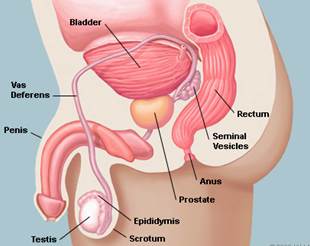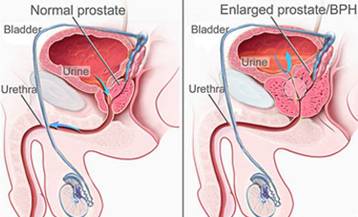What is prostate gland?

The prostate is a walnut-sized gland located between the bladder and the penis. The prostate is just in front of the rectum. The urethra runs through the center of the prostate, from the bladder to the penis, letting urine flow out of the body.
The prostate secretes fluid that nourishes and protects sperm. During ejaculation, the prostate squeezes this fluid into the urethra and it’s expelled with sperm as semen.

The vasa deferentia (singular: vas deferens) bring sperm from the testes to the seminal vesicles. The seminal vesicles contribute fluid to semen during ejaculation.
As a man ages, there is a good chance that he will develop an enlarged prostate or benign prostatic hyperplasia (BPH). In fact, it is estimated that close to 80% of men will develop BPH. and more than 40% of men who develop an enlarged prostate will need treatment to correct symptoms from this enlarged prostate
Symptoms & causes of enlarged prostate (BPH)
- A weak or slow urinary stream
- A feeling of incomplete bladder emptying
- Difficulty in starting urination
- Frequent urination
- Urgency to urinate
- Getting up frequently at night to urinate
- A urinary stream that starts and stops
- Straining to urinate
- Continued dribbling of urine
- Returning to urinate again minutes after finishing
When the bladder does not empty completely, you become at risk for developing urinary tract infections. Other serious problems can also develop over time, including bladder stones, blood in the urine, incontinence, and acute urinary retention (inability to urinate). A sudden and complete inability to urinate is a medical emergency; you should see your doctor immediately. In rare cases, bladder and/or kidney damage can develop from BPH.
Most men have continued prostate growth throughout life. In many men, this continued growth enlarges the prostate enough to cause urinary symptoms or to significantly block urine flow. Doctors aren't sure exactly what causes the prostate to enlarge. It may be due to changes in the balance of sex hormones as men grow older.
Risk factors & complications of enlarged prostate (BPH)
Risk factors
- Aging. Prostate gland enlargement rarely causes signs and symptoms in men younger than 40. By 55, about 1 in 4 men have some signs and symptoms. By 75, about half of men report some symptoms.
- Family history. Having a blood relative such as a father or brother with prostate problems means you're more likely to have problems as well.
- Where you're from. Prostate enlargement is more common in American and Australian men. It's less common in Chinese, Indian and Japanese men.
Complications
Prostate gland enlargement becomes a serious problem when it severely interferes with your ability to empty your bladder. If this is the case, you'll probably need treatment. Complications of enlarged prostate include:
- Acute urinary retention. Acute urinary retention is a sudden, painful inability to urinate. This may occur after you've taken an over-the-counter decongestant medication for allergies or a cold. When you are unable to urinate at all, your doctor may thread a tube (catheter) through your urethra into your bladder. Or, your doctor may put in a suprapubic tube , a catheter that drains your bladder through the lower abdomen. The type of catheter you need will depend on your particular circumstances.
- Urinary tract infections (UTIs). This occurs because of incomplete emptying of blooder which becomes prone to develop infection.
- Bladder stones. These are mineral deposits that can cause infection, bladder irritation, blood in the urine and obstruction of urine flow and are generally caused by the inability to completely empty the bladder.
- Bladder damage. This occurs when the bladder hasn't emptied completely over a long period of time. The muscular wall of the bladder stretches and weakens and no longer contracts properly. Often, symptoms of bladder damage improve after prostate surgery or other treatment, but not always.
- Kidney damage. This is caused by high pressure in the bladder due to urinary retention. This high pressure can directly damage the kidneys or allow bladder infections to reach the kidneys. When an enlarged prostate causes obstruction of the ureteric openings, it causes swelling of the collecting system of the kidney. This condition is called hydronephrosis.
- Most men with an enlarged prostate don't develop these complications. However, acute urinary retention and kidney damage in particular can be serious health threats when they do occur.
Tests & diagnosis of enlarged prostate (BPH)
- Detailed questions about the symptoms.
- Digital rectal exam. This exam can determine whether your prostate is enlarged or not.
- Urine test (urinalysis). It can help rule out an infection or other conditions that can cause similar symptoms.
- Prostate-specific antigen (PSA) blood test. It's normal for your prostate gland to produce PSA, which helps liquefy semen. When you have an enlarged prostate, PSA levels increase. However, PSA levels can also be elevated due to prostate cancer, recent tests, surgery or infection (prostatitis).
- Urinary flow test. This test measures the strength and amount of your urine flow.
- Post-void residual volume test. This test measures whether you can empty your bladder completely. This is often done by using an ultrasound test to measure urine left in your bladder.
- Transrectal ultrasound. An ultrasound test provides measurements of your prostate and also reveals the particular anatomy of your prostate.
- Prostatic biopsy. in this procedure, transrectal ultrasound guides a needle to take tissue samples of the prostate. Examining tissues from a biopsy under a microscope can help diagnose or rule out prostate cancer.
- Urodynamic studies and pressure flow studies. With these procedures, a catheter is threaded through your urethra into your bladder. Water (or less commonly air) is slowly injected into your bladder. This allows your doctor to measure bladder pressures and to determine how well your bladder muscles are working.
Prostate cancer is entirely different than prostate gland enlargement, even though they can cause some similar symptoms and may be detected by some of the same tests. Having an enlarged prostate doesn't reduce or increase the risk of prostate cancer. Even if you're being treated for an enlarged prostate gland, you still need to continue regular prostate exams to screen for cancer.
 The prostate is a walnut-sized gland located between the bladder and the penis. The prostate is just in front of the rectum. The urethra runs through the center of the prostate, from the bladder to the penis, letting urine flow out of the body.
The prostate is a walnut-sized gland located between the bladder and the penis. The prostate is just in front of the rectum. The urethra runs through the center of the prostate, from the bladder to the penis, letting urine flow out of the body.
